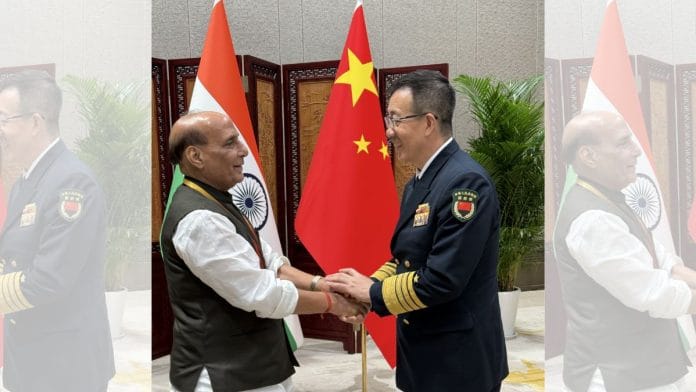At first glance, the back-to-back meetings of India’s Defence Minister Rajnath Singh and National Security Adviser Ajit Doval with their Chinese counterparts at the Shanghai Cooperation Organisation’s June 2025 sub-forums suggest progress. But these engagements—occurring after months of bilateral dormancy—were less about mending ties and more about performing diplomacy without reconciling underlying disputes.
There is a tendency, especially in diplomatic and at times academic circles, to treat dialogue itself as progress. But the India-China dynamic resists this logic. The SCO meetings revealed that both sides are talking—but not listening. Their strategic priorities remain fundamentally at odds. Neither country is ready to make a grand bargain. Instead, what we are witnessing is tactical civility—a willingness to meet and maintain protocol, even as the core disputes remain frozen.
As we move through 2025, these sideline interactions offer a sobering forecast. The relationship is unlikely to worsen dramatically—both sides appear to recognise the costs of escalation. But nor will it improve in substantive terms. The border disengagement talks remain sluggish, economic coercion remains, and trust deficits grow deeper.
From India’s perspective, the SCO is no longer just a regional forum—it is a platform to publicly frame China’s selective strategic ethics. For China, it remains a venue to project regional leadership while avoiding contentious bilateral give-and-take. The road ahead is one of managed contestation, and 2025 may not be a long-awaited year of breakthrough. Rather, it is poised to be a year of rehearsed diplomacy for the India-China bilateral—while remaining locked in a deeper competition over whose rules will govern the Asian order.
Also read: Japan is stepping back from NATO, not Indo-Pacific ties—China is watching the cracks closely
Diplomatic choreography
At a moment when the recovering India-China ties remain confined in intense competition—over their Global South engagements, agriculture security concerns, rare earth magnet contestations, concerns about border posturing, and growing influence in multilateral institutions—the SCO provides a rare setting where both sides sit across the same table without the baggage of Western-led frameworks. What makes the SCO interactions more than just symbolic is the deepening disconnect between diplomatic optics and strategic realities.
While Singh called out cross-border terrorism and refused to sign the SCO joint communique—citing the omission of the Pahalgam terror attack and the inclusion of Balochistan references—China’s muted response reaffirmed its long-standing unwillingness to name Pakistan-based groups or engage with India’s threat perceptions.
By highlighting the selective invocation of terrorist incidents in the draft communique, India exposed what it sees as China’s complicity in normalising Pakistan’s strategic duplicity on terrorism. The episode illustrates how even procedural formalities in multilateral diplomacy are deeply entangled with normative and political contestation.
China’s reluctance to name or blame Pakistan-based terror groups has long irritated New Delhi, with Pahalgam becoming a stress test for China-India relations. India has presented a diplomatic rebuke—also seen via NSA Doval’s call for rejecting “double standards”—at the SCO over what it sees as selective morality in the fight against terrorism. Moreover, this occurs during China’s presidency of the SCO, giving it agenda-setting power that subtly reinforces its own narrative preferences. That India chose to push back within this multilateral structure—especially by refusing to sign the communique—suggests that New Delhi is no longer willing to accept consensus at the cost of principle. The stage-managed neutrality of the SCO is thus being actively contested, not just navigated.
What renders this episode more consequential is that this diplomatic friction is unfolding in parallel with Beijing’s sustained economic coercion. While participating in multilateral forums under the banner of Eurasian cooperation, China has simultaneously curtailed rare earth magnet exports and delayed critical agri-tech inputs to India—without formal justification. These informal sanctions signal a familiar pattern: China leverages strategic interdependencies as instruments of pressure, while continuing to engage just enough to maintain the appearance of stability.
This contradiction—China’s tactical civility in diplomatic settings contrasted with its coercive posture on the ground—is the defining feature of the current bilateral. While border talks stall and trust deficits widen, the illusion of progress is maintained through protocol-heavy summits. The decision by President Xi Jinping to skip the BRICS summit in Rio later this month reportedly in response to Brazilian President Lula da Silva’s invitation to host Prime Minister Narendra Modi for a state dinner reinforces the same pattern: diplomatic performance masking political discomfort.
As the SCO Summit in Tianjin approaches, the possibility of Modi visiting China—his first since the 2020 Galwan clash—adds a significant layer to the unfolding diplomatic choreography. While such a visit will be closely watched for signals of rapprochement, it is unlikely to reflect any fundamental shift in bilateral dynamics. The visit will serve more as a gesture of India’s commitment to multilateralism than a sign of restored trust. For New Delhi, participation in the summit is about maintaining diplomatic engagement without allowing it to be misinterpreted as a return to business as usual. The road ahead remains shaped by caution, calibrated signalling, and the recognition that strategic differences with Beijing continue to outweigh symbolic overtures.
Eerishika Pankaj is the Director of Organisation for Research on China and Asia (ORCA), a New Delhi-based think tank. She tweets @eerishika. Views are personal.
(Edited by Aamaan Alam Khan)






